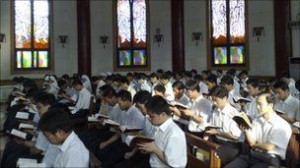 I’m preparing an article for the Lausanne website on why China would be reportedly investing in Christianity. Would you be able to give input to the article by clicking below on “comment?” Feel free to do so completely anonymously. Please read the article before commenting. Here’s your chance to be heard in an article that will be leading up to the Lausanne meeting in Cape Town. Here’s the article (and thanks to Lissa for uncovering it up for me!):
I’m preparing an article for the Lausanne website on why China would be reportedly investing in Christianity. Would you be able to give input to the article by clicking below on “comment?” Feel free to do so completely anonymously. Please read the article before commenting. Here’s your chance to be heard in an article that will be leading up to the Lausanne meeting in Cape Town. Here’s the article (and thanks to Lissa for uncovering it up for me!):
http://www.bbc.co.uk/news/world-asia-pacific-11020947
Thanks for any response you can offer.












This is an interesting article, and I believe it’s a true representation of this segment of the Body in China. In fact, I personally know one of the students who was pictured and quoted in the story of the Haidian Church.
However, as in many stories about China, it does not tell the whole story. Those who gather to worship outside the Three-Self church structure (the government-sanctioned church) are still considered to be breaking the law.
There has been a significant shift in the government’s and the people’s attitudes towards Christianity in the past 10 years. Christians are much more open about their beliefs and the government has seen positive outcomes of believers investing in meeting the needs in society. As the urban Body becomes more influential and involved, the government has had to deal with religious entities differently than it did in the past.
NPR aired a series this summer entitled “New Believers: A Religious Revolution in China”–on the Web at http://www.npr.org/templates/story/story.php?storyId=128644059
It includes the story “Beijing Finds Common Cause with Chinese Buddhists,” which quotes a researcher at the University of Ottawa as saying, “I have reason to believe the Chinese government might be encouraging Buddhist institutions, simply because they’re worried about the rapid spread of Christianity and Protestantism in particular” (http://www.npr.org/templates/story/story.php?storyId=128691021).
The series also has articles on Protestants and Catholics in China.